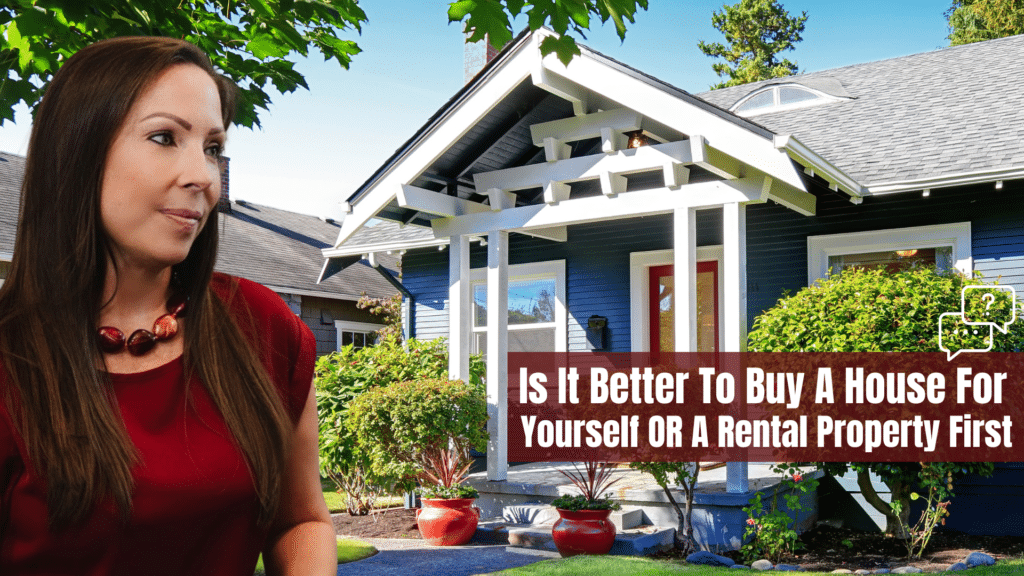
Buy A Home or Rental Property First? Decoding the Debate
When we talk about investing in real estate, the conversation often hinges on one critical question: should you buy your primary residence first or invest in a rental property? It’s a common dilemma, especially for first-time buyers and aspiring investors. Each path has its own merits and challenges, and which route you choose could significantly shape your financial future.
In this post, we’ll explore the pros and cons of buying a home versus purchasing a rental property first. Whether you’re in the Greater Toronto Area (GTA), the Durham Region, or anywhere across Canada, this decision needs to be informed by personal financial goals, the real estate market, and your risk tolerance.
The Emotional Case for Buying a Home First
For many people, owning a home represents the pinnacle of personal success. It’s the classic dream—having a space that is truly yours, where you can put down roots and customize as you like. Buying your own home first provides a sense of stability and emotional satisfaction that’s hard to beat.
Pros of Buying a Home First
Emotional Security and Stability Homeownership provides a feeling of permanence. You no longer have to worry about your landlord selling the property or raising the rent. You’re in control of where you live, which brings a sense of security that renting can’t offer. If you have a family, a home can give you stability, helping to nurture long-term relationships with your community, schools, and neighbours.
Principal Residence Tax Exemption One major financial perk of buying a home first is the capital gains tax exemption you get when you sell your principal residence in Canada. Any increase in the value of your home over the years is generally tax-free, which is a huge advantage in the long run, especially in growing markets like Toronto and Durham.
Forced Savings Mortgage payments essentially act as a forced savings plan. A portion of your payment goes towards reducing the mortgage principal, increasing your home equity over time. Unlike renting, where your monthly payment is money out the door, homeownership builds long-term wealth.
Cons of Buying a Home First
High Upfront Costs In Canada, homeownership comes with hefty upfront costs. These include the down payment (typically 5%–20%), closing costs (like legal fees, land transfer taxes, and home inspection fees), and ongoing expenses (property taxes, maintenance, and utilities). For those who are just starting out, this can deplete savings that could otherwise be used for investing.
Limited Cash Flow When you buy your own home, it’s an asset on your balance sheet, but it doesn’t generate income unless you rent part of it out (which comes with its own set of challenges). Your home might appreciate over time, but it won’t help you cover monthly costs in the short term.
Potential Mobility Constraints Owning a home ties you to a specific location. If you’re early in your career or uncertain about where you want to live long-term, buying your own home may not offer the flexibility you need.
The Investment Case for Buying a Rental Property First
On the other side of the debate is the option to purchase an income-generating rental property before your personal residence. This strategy focuses on building wealth and cash flow, often considered a more financially aggressive and calculated move.
Pros of Buying a Rental Property First
Immediate Cash Flow A rental property generates income right away. If done right, you could be collecting rent that covers your mortgage and leaves you with extra cash every month. This cash flow can be used to reinvest in more properties or save for a down payment on your own home later.
Building Wealth Through Leverage In real estate, leverage (borrowing to invest) is key. A rental property lets you take advantage of this. You use the bank’s money to buy an asset that, ideally, appreciates over time while also generating rental income. Over the long term, this can snowball your wealth as your mortgage is paid down, rents increase, and the property’s value appreciates.
Tax Advantages Owning a rental property can come with several tax benefits. In Canada, you can deduct mortgage interest, property taxes, insurance, and maintenance expenses from your rental income. While capital gains tax will apply when you eventually sell the rental property, many of the costs can be written off to reduce your taxable income along the way.
Scaling Opportunity By buying a rental property first, you can scale your real estate portfolio more quickly. The rental income and potential appreciation give you equity to leverage into more properties. This could lead to significant wealth accumulation over time, far surpassing the value of a single home you live in.
Cons of Buying a Rental Property First
Higher Risk Investing in a rental property, especially as your first real estate purchase, comes with higher risk. There’s no guarantee of steady rental income, and you may experience periods of vacancy. You’re also responsible for the upkeep of the property and dealing with tenants, which can be both time-consuming and costly.
Stricter Lending Requirements Mortgage lenders often have stricter requirements for investment properties than for owner-occupied homes. You might need a larger down payment (often 20% or more), and your mortgage rate could be higher. Plus, rental income is typically only partially factored into your debt-to-income ratio, which could limit your borrowing power.
Potential Cash Flow Strain If your rental property doesn’t generate enough income to cover all the expenses, you could find yourself in a cash flow crunch. Unexpected repairs, vacancies, or tenant issues can cut into your profits and even lead to financial strain if you’re not prepared.
So, Which One Is Right for You?
There’s no one-size-fits-all answer here. Your decision to buy a home or a rental property first depends largely on your personal goals, risk tolerance, and financial situation.
When to Buy a Home First
If stability and long-term security are your top priorities, and you plan to stay in one place for the foreseeable future, buying a home first might make the most sense. This is especially true if you have a family or want to lock in today’s interest rates and home prices in your desired location.
Buying a home first also makes sense if you’re looking for peace of mind and don’t want the added complexity of managing tenants or the risks associated with investment properties.
When to Buy a Rental Property First
If you’re financially stable, have a solid emergency fund, and are focused on building wealth more aggressively, buying a rental property first could be the smarter play. This approach works best for those who have the time and willingness to manage a property or who plan to hire a property manager.
It’s also ideal for those who want to scale their investment portfolio quickly and are comfortable with a higher level of risk.
A Balanced Approach
For some, a hybrid approach might be ideal. For example, buying a duplex or triplex and living in one unit while renting out the others can give you the best of both worlds—homeownership with rental income to offset your costs.
This strategy allows you to build equity in your home while reducing your personal housing expenses and gaining experience as a landlord.
In the end, the decision between buying a home or a rental property first depends on your long-term financial goals and lifestyle preferences. Do you value the emotional comfort of owning your home, or are you more interested in building wealth through real estate investments? Neither choice is inherently better, but each comes with unique advantages and trade-offs.
Before making your decision, take a close look at your financial situation, your risk tolerance, and your real estate market. If you’re uncertain, consult with a financial advisor or a real estate professional who understands both sides of the equation.
Whichever path you choose, remember that real estate can be a powerful tool for building long-term wealth. Whether it starts with your dream home or your first rental property, the key is to take that first step and learn along the way.
For other great articles specific to real estate investing, click here and check out these articles also!
- Buy A Home Or Rent and Invest
- How To Screen A Tenant
- Buy A Home And Rent It Out
- How To Use The Smith Manouvre To Buy A Home
If you’re thinking about buying, selling or investing in Durham Region or Toronto, let’s chat! I can be reached at 647-896.6584, by email at info@serenaholmesrealtor.com or by filling out this simple contact form. You can also kick off your search for Durham Region homes for sale by clicking here.
In addition, make sure we’re connected on social @serenaholmesrealtor and you’ve subscribed to my YouTube Channel. And, for other articles specific to real estate investing, click here.










